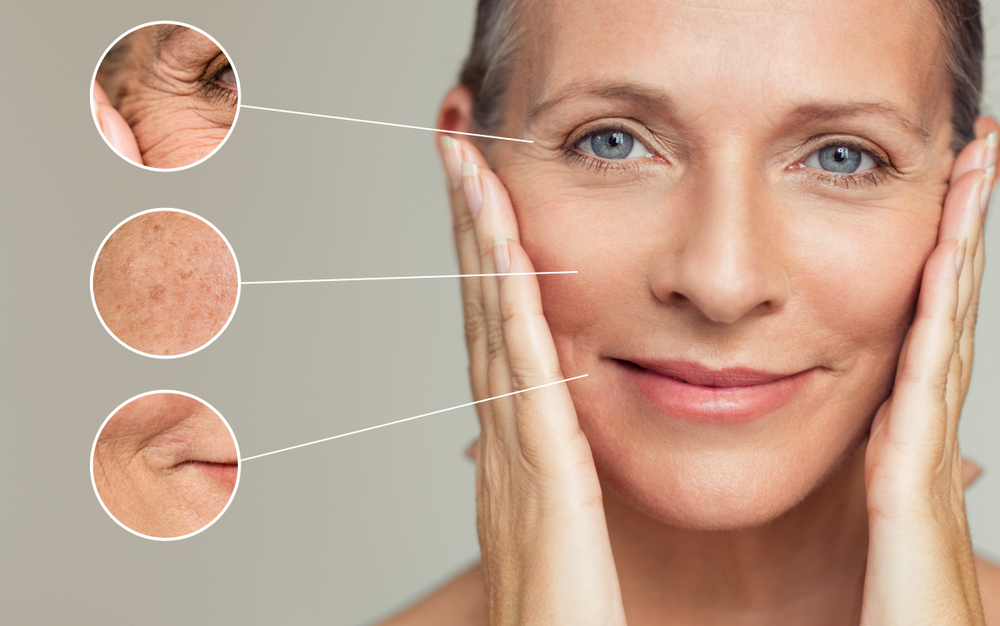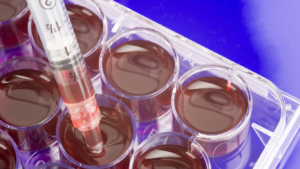Rapamycin, an anti-cancer and anti-aging drug, is typically used to prevent rejection in patients with organ transplants, reduce the likelihood of certain lung diseases, and act as a coating for coronary stents. However, recently scientists have become interested in another important benefit of the drug – its anti-aging properties. In a now-dated study, Rapamycin was found to lengthen the lifespan of mice by 14% for females and 9% for males when used as a dietary additive. Since that promising study, researchers have been intent on finding how Rapamycin may aid longevity and treat aging-related diseases in humans – including skin aging.

What is Rapamycin?
Rapamycin is secreted by a bacterium known as Streptomyces hygroscopicus. The bacterium was first found on Easter Island when scientists took soil samples in 1972. In the native language, Easter Island is called “Rapa Nui” and was used as the basis of Rapamycin’s name.
The bacterium uses Rapamycin to help protect it from other bacteria and fungi, and unsurprisingly, Rapamycin was first used as an antifungal. Eventually, it also began being used as an immunosuppressant when a drug known as Rapamune was approved in 1999 by the United States Food and Drug Administration for kidney transplant patients. Finally, the substance was found to be a beneficial anti-tumor drug as it restricts cell growth, notably cancerous or malignant cells.
How does Rapamycin work?
Rapamycin works by inhibiting a protein known as mTOR that aids in cell division, survival, and other functions. mTOR signals the body’s cells to metabolize and grow; cell growth is prohibited when Rapamycin disrupts the signal. Preventing the growth of cells can be beneficial in certain conditions like cancer, Alzheimer’s disease, and cellular senescence. mTOR is naturally inhibited by fasting and triggered by ingesting certain foods, such as carbohydrates. Learn more about how intermittent fasting improves aging.

Is Rapamycin effective against aging?
Rapamycin is a multifaceted drug with many uses in preventing and treating age-related issues, such as lifespan, age-related health concerns, and skin degeneration.
Increase longevity
More research needs to be done on how Rapamycin’s mTOR disruption aids in longevity; however, it has been shown to extend the lifespan of mice, yeast, fruit flies, and worms. Researchers theorize that when the mTOR protein is decreased, the body is signaled to conserve resources until more fruitful times. As such, its growth is suppressed while cells’ defense against oxidative stressors increases. In basic terms, suppressed mTOR tells your body’s cells to repair and maintain health instead of growing.
Prevent age-related diseases
Scientists also think that it may help prevent age-related diseases like neurodegeneration. A conclusion has not been reached on how Rapamycin may decrease the chances of age-related disease. Still, research indicates that the drug’s ability to halt cell growth and improve cell health may be due to autophagy, a process that removes damaged and abnormal cell parts.
Prevent and treat skin aging
Additionally, autophagy may assist with the aging of skin as it tells cells to repair themselves instead of stimulating growth, which as we age results in geroconversion or cell deterioration. When skin cells enter cellular senescence, they aren’t rejuvenating themselves into fresh, youthful cells but neither are they dying and being replaced. Therefore, they are simply aged and functioning at a less-than-optimal level. Because Rapamycin encourages autophagy or cell restoration, it may help skin look more youthful.
Rapamycin’s advantages for the skin include decreasing wrinkles, age spots, and photoaged skin. When applied topically, Rapamycin can potentially treat psoriasis, vascular anomalies, and other skin-related diseases. Another study found it helpful in treating tuberous sclerosis, in which benign tumors can grow on the skin, with 73% of participants reporting an improvement in their skin. Another study found that low-dose Rapamycin cream applied to one hand found improved collagen protein, fewer senescent cells, and diminished aged markers after just eight months compared to the participant’s other placebo-treated hand.
Notably, Rapamycin applied to the skin was not absorbed into the body and proved effective in children and young adults.
Other Rapamycin benefits
- High blood pressure
- Cardiovascular health
- Osteoporosis
- Arthritis
- Autoimmune diseases
- Diabetes
- Obesity
- Macular Degeneration

Rapamycin may be effective no matter your age
In a study on Rapamycin’s effects on skin-aging markers, all participants were aged 40 or older and showed signs of age-related photoaging and dermal volume loss. Many of them improved skin appearance and boosted collagen levels after being treated with topical Rapamycin, proving that it can be an effective anti-aging therapy for the skin even if not started until later in life. This is unlike other skin treatments, which require consistent use over time to achieve benefits.
Similarly, unlike other drugs that must be started early to improve longevity and decrease age-related diseases, Rapamycin can be beneficial even when begun at a mature age. One study found the drug still may increase lifespan by 9-14% in older individuals.
In addition to its late-life benefits, Rapamycin may not have to be taken consistently to work. Another study suggested that only three months of a high dose significantly increased lifespan. Therefore, a brief stint of Rapamycin may still prove beneficial while lowering the risk of side effects.
Are there any side effects of Rapamycin?
Human trials using the drug to treat age-related issues have found few side effects. Studies show that Rapamycin appears safe for use, even in older patients, as long as they are otherwise healthy. It’s important to note that topical application of Rapamycin for age-related skin issues did not result in systemic absorption and therefore did not produce adverse side effects that can be encountered with Rapamycin, like low platelet count.
The primary concern with Rapamycin is that it can suppress immune function. Although some experts suggest that the doses taken for anti-aging effects don’t suppress immunity but rather “eliminates hyperimmunity,” essentially resetting the immune system in the elderly.
Most side effects of Rapamycin are mild, and related to the size and frequency of dosing. These can include:
- Low platelet count
- Anemia
- Altered insulin sensitivity
- Delayed wound healing
- Fatigue
- Ulceration or inflammation of the mouth
- Elevated cholesterol
Some side effects can be reversed, like low platelet count, by stopping drug use. Other side effects necessitate stopping treatment. Nevertheless, Rapamycin may be prescribed in low doses or intermittently in anti-aging dosages and regimens, which may decrease the chances of side effects.
In conclusion, Rapamycin shows immense promise for anti-aging benefits. Its key advantages include:
- slowing cellular aging
- extending lifespan
- promoting healthspan
- enhancing immune function
- reducing chronic inflammation
- delaying age-related diseases
Additionally, Rapamycin’s ability to improve metabolic health, enhance autophagy, and its potential for combination therapies further contribute to its potential as a revolutionary anti-aging compound. While research is ongoing, Rapamycin remains a beacon of hope in the pursuit of a longer, healthier, and more fulfilling life. Remember to consult a ViveWell provider before considering Rapamycin for anti-aging purposes. Use the link below to book a longevity/anti-aging appointment to learn more about your options.






